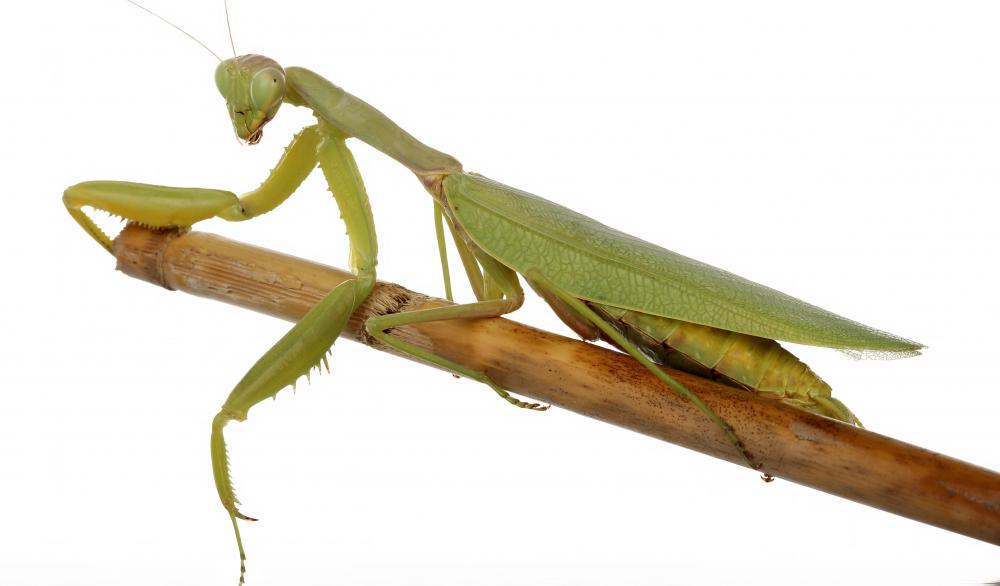At WiseGEEK, we're committed to delivering accurate, trustworthy information. Our expert-authored content is rigorously fact-checked and sourced from credible authorities. Discover how we uphold the highest standards in providing you with reliable knowledge.
What can I do About Lawn Pests?
They bite, sting, infect, and destroy. Left unchecked, they can ravage everything in their path. Leaving the safety of one’s home is to venture into occupied territory. It’s a jungle out there.
More commonly, that jungle is known as “the lawn.”

Few things can drive a homeowner to the brink of insanity more quickly than lawn pests. Ants, fleas, chiggers, and ticks thrive in the average lawn. They may cause incessant itching and scratching, or pass along parasitical ailments such as Lyme Disease or Rocky Mountain Spotted Fever. Aphids feast upon small trees and plants, while armyworms, cutworms, and grubs can turn that lovely, green expanse into a nightmarish landscape of brown dirt. The larger pests, moles for instance, will cause carefully tended turf to resemble a minefield.

However, there are some very effective methods for dealing with lawn pests. Dependent upon one’s environmental stance, and level of irritation, one may select from a variety of solutions. The homeowner can attempt to dissuade lawn pests by organic methods, resort to traps and poison, or kill the entire insect population with a broad-spectrum insecticide.

Those wishing to remove lawn pests can choose the do-it-yourself method, or hire a professional exterminator. The latter will generally be the most expensive option, but the homeowner will be saved the task of identifying the problem, purchasing applicators and products, and carefully reading labels. For the well-being of adults, children, and pets, reading the labels is of utmost importance. Most insecticides will do their job, kill the lawn pests, and then dissipate. However, one must be acutely aware of time frames and safety issues.

A professional exterminator knows these facts by heart. The average homeowner must study and learn. The professional exterminator is also aware of laws and ordinances regarding insecticide use. Regulations and restrictions vary by country, state, county, and even city or town. If one does decide to personally handle removal, it is a good idea to first call the local agricultural extension service for advice.

The first step lies in determining what pests are present. However, most people simply opt to destroy the entire population and be done with it. Chemical insecticides are available in liquid, powder, or granular form, and will typically kill all insects in a yard. Depending upon the season and the region, re-application will be required several times during spring and summer.

When trying to dispense with fleas, ticks, ants, and mosquitoes, two of the most common and effective chemical insecticides go by the names of Sevin and Dursban. These are toxic chemicals, and one should read all warnings and directions before commencing application. Pyrethrin, a derivative of a type of chrysanthemum, is known to be a very effective agent against lawn pests such as grubs and worms. However, it is also toxic, and all suggestions for use should be followed to the letter.

For those averse to chemical warfare against lawn pests, there are alternatives. Bugs and lawn pests do not subsist entirely on grass, roots, flowers, and trees. They also eat other bugs. Possibly the two most effective allies against harmful pests are the Lady Bug and the Praying Mantis. These helpful insects can be purchased at larger home and garden centers, or by mail order.

The Praying Mantis has an insatiable appetite and is one of the top predators in the insect world. It will gladly seek out and consume a variety of beetles, grubs, grasshoppers, and caterpillars. Lady Bugs are more effective if released in flowerbeds, and will devour aphids and leaf worms with gusto.
One should not overlook the introduction of nematodes to a lawn. These microscopic worms will infect not only grubs, but also over 200 species of insect larvae. The bacteria they carry, not harmful to humans or pets, will usually kill harmful grubs within forty-eight hours of infection. Another natural bacteria, known as Milky Spore, is equally deadly to lawn-destroying grubs. And advantage of the Milky Spore, should one opt to utilize a variety of methods to protect their lawn, is that it is virtually immune to chemicals and pesticides.
Moles are a different story entirely. While some people may attempt to live-trap a mole, the proposition is largely futile. Typically, moles are terminated via “harpoon-type” traps, or via a product generically known as “poison peanuts.” The latter is not recommended if children or pets frequent the lawn.
Of course, a homeowner averse to wiping out the bug population may simply choose to live with the pests, secure in the knowledge that colder weather and Mother Nature will temporarily solve the problem.
AS FEATURED ON:
AS FEATURED ON:


















Discussion Comments
I am visiting my parents in Kansas and was walking in the backyard and these itty bitty black bugs were on my feet when I walked inside, as well as on my mom's socks, and they are smaller than a pin head, fly a little and are to catch. When you get one to kill it is like nothing to it, it just kind of smudges like a black mark? Any ideas what they are or how to kill them?
Thanks, Wise Geek, for the great ideas list!
Marigolds and a few other flowers will repel pests, too.
I am not sure about the Ladybug/Praying Mantis idea on one point - they both eat bad bugs, but I think the Praying Mantis will eat the ladybugs, too, so we might not want to try to use both.
A solution of plain antibacterial dishwashing detergent will work on lots of the nasty tiny bugs, plus some of the fungal things.
With these alternative methods, I usually only go threw one spray can of bug spray a year at most. I don't like to use such, but having one thing of the nasty bug killer on hand for an invasion of pests, one hour before guests are due has proven wise.
elle smith fagan
I desperately need help in getting rid of moths. I believe that they are in all my closets because I frequently find holes in my clothes. How do I destroy them completely, I mean from their roots.
Thanks, Danielle
Post your comments